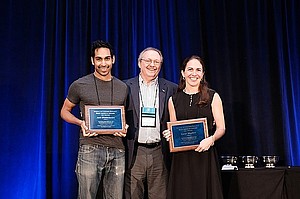‘Happiness through experiences’ research wins JCR best article award

Dr Amit Bhattacharjee from Rotterdam School of Management, Erasmus University (RSM) and ERIM Member won a Journal of Consumer Research (JCR) Best Article Award for his research and knowledge about consumer behaviour. He received the award at the annual Association for Consumer Research conference, which took place in San Diego, California, USA, on Saturday 28 October 2017.
The JCR Best Article Award goes to the article that has made the greatest contribution to knowledge about consumer behaviour over the last three years. Dr Bhattacharjee co-wrote the winning research paper Happiness from Ordinary and Extraordinary Experiences with Cassie Mogilner Holmes, now an associate professor of marketing at the Anderson School of Management, UCLA. It was published in the Journal of Consumer Research in June 2014.
Happiness from experiences
As noted in the paper’s abstract, prior research indicates that experiences bring greater happiness than material possessions. But which experiences result in the greatest happiness? This paper is one of the first to categorise types of experiences and highlights one important distinction: the extent to which an experience is common and frequent (ordinary) versus uncommon and infrequent (extraordinary). Eight studies examine the experiences individuals recall, plan, imagine and post on Facebook. These findings suggest that the happiness enjoyed from ordinary and extraordinary experiences depends on age.
The role of self-definition
Younger people, who view their future as extensive, gain more happiness from extraordinary experiences. However, ordinary experiences become increasingly associated with happiness as people get older, such that they produce as much happiness as extraordinary experiences when individuals have limited time remaining.
Self-definition drives these effects: although extraordinary experiences are self-defining throughout someone’s life span, as people get older they increasingly define themselves by the ordinary experiences that comprise their daily lives.
Key managerial insights
Brand managers are increasingly recognising the benefits of experiential marketing, but often assume extraordinary experiences to be inherently superior. Accordingly, practitioners often strive to transform ordinary experiences into extraordinary ones. But these findings suggest that managers may overlook the benefits of ordinary experience. Realising the benefits of experiential marketing depends on promoting and highlighting the types of experiences most appropriate for a given target segment.


